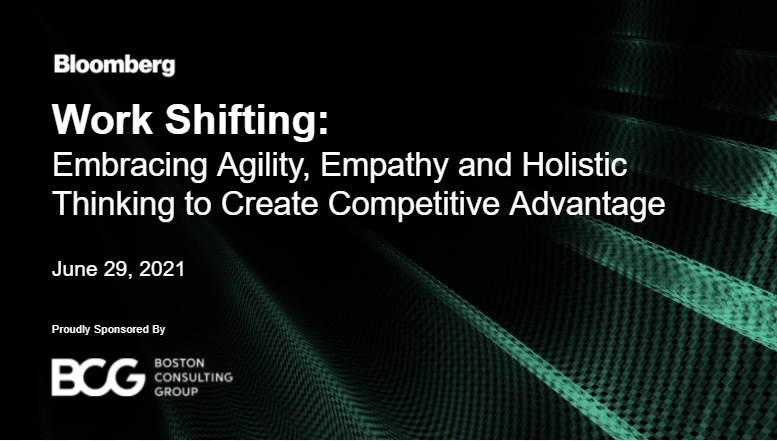
Work Shifting: Embracing Agility, Empathy and Holistic Thinking to Create Competitive Advantage
June 29, 2021
Event Highlights
Work is shifting. The pandemic’s unprecedented toll on global business means companies from every industry continue to deal with the knock-on effects of shutdowns, uneven commerce and an uncertain labor market. This future of work is not the distant, AI-enabled one we talked about before 2020, but in the very real and very immediate next 12-to-24 months as many companies retool to meet ongoing challenges.
The future hinges on how fast and how well companies can pivot to face these challenges — and embrace some opportunities: building and expanding their digitization strategies; continuing to innovate as we recognize that some changes are here to stay; demonstrating capable, compassionate, empathetic leadership; and clearly communicating ideas and directives both internally and externally.
At this roundtable, we brought together a group of business leaders to talk about the changes under way in their respective industries and how each is meeting the challenges of the current environment.
PARTICIPANTS
Bharat Khandelwal, Managing Director & Partner, BCG
Richard Batelaan, Executive Vice President of North America Operations, Lumen
Kamal Bhatia, Senior Executive Director & Chief Operating Officer, Principal Global Investors
Becky Frankiewicz, U.S. President, ManpowerGroup, Inc.
Tamla Oates-Forney, SVP and Chief People Officer, Waste Management
Eric Palmer, Evernorth President and Chief Operating Officer, Cigna Corporation
Jennifer Weber, Senior Vice President & Chief Human Resources Officer, Archer Daniels Midland
Moderator: Carol Massar, Anchor, Bloomberg Businessweek on Bloomberg Television and Radio
Click HERE to view the video of the full discussion.
Becky Frankiewicz, U.S. President, ManpowerGroup, Inc., said workplaces are entering a new phase of adjusting to the pandemic as employees reawaken. “The crisis has changed us. We are changed. People are reprioritizing one life — they want to live from work versus work from home, and we’re in the middle of this huge dynamic of an empowered worker in our country and the ramifications can be scary. But they’re so incredibly fascinating to watch unfold in front of us,” she said.
As the pandemic tested workers’ physical and mental health, Jennifer Weber, Senior Vice President & Chief Human Resources Officer, Archer Daniels Midland, said companies need to respond to both. “I think what this has done is it has provoked healthier conversations about the broad health and well-being of each other, of our people, our obligation as an employer to make sure we’re availing ourselves of the services and the education that employees need to make sure they are caring for themselves. I think that that’s been one of the healthier pivots for organizations. Because organizations are set up to foster success and progression and development of careers, and sometimes the ability to say ‘I’m struggling, I need additional help, my family is struggling’ — we had to make that easy,” she said.
Tamla Oates-Forney, Senior Vice President, Chief People Officer Waste Management, said employers need to be honest with employees about who can and can’t continue working remotely. “What we’re trying to do is provide safety and flexibility, and the application of safety and flexibility looks different depending on the type of work that you do. We also said when you’re driving a truck, you have a start and an end time. But what the people in the office were experiencing was that when they started working from home, it kinda bled in. We didn’t know how many hours they were working, so, in some cases, they might have been working even more than they were when they were in the office. We recognized the difference in the job and we faced it head on,” she said.
Kamal Bhatia, Senior Executive Director & Chief Operating Officer, Principal Global Investors, said that companies are still confronting how to promote research and development in a remote setting. “In the virtual world, like this medium we’re in, I think it’s easy to transmit logic, but it filters out emotions. The way human beings do R&D and product development is not just always math. It’s about diverse people coming together, emotionally challenging each other and building a better product. So I think that’s where the debate still lies: Can the virtual world continue the emotional engagement?” he said.
In fact, Eric Palmer, Evernorth President and Chief Operating Officer, Cigna Corporation, said that, at times, the virtual world can actually facilitate more spontaneous ideation than the office. “Innovation can continue to happen, but it’s got to be cultivated in a different way. In fact, I think there’s a bright side. A silver lining of some of this past year has been that us being deliberate about who we convene, how we connect, has created opportunities for folks throughout our organization to connect that wouldn’t have even had the chance to connect previously or wouldn’t have bumped into each other in the halls,” he said.
While existing relationships powered the transition to virtual work, Richard Batelaan, Executive Vice President of North America Operations, Lumen, said companies will need to focus on building ties with new employees. “I look at four things: relationships, accountability, motivation and process. The relationship piece is what’s gonna drive the hybrid environment going forward. There’s just no way to have a 100 percent work from home as you’re onboarding new employees constantly,” he said.
——————————
Instagram: @BloombergLive
LinkedIn: Bloomberg Live
Twitter: @BloombergLive
Interested in more Bloomberg Live virtual events? Sign up here to get alerts.
——————————
